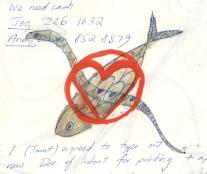Canada
Toronto information on
Survivors History site
Mad People's History (Toronto)
School of Disability Studies - Ryerson University - 350 Victoria Street -
Toronto - Ontario - M5B 2K3 - Canada
http://www.ryerson.ca
School of Disability Studies
Course Descriptions: The DST 504 "Mad People's History" course
provides "an overview of the
history of madness from the point of view of people who were, and are,
deemed 'mad'". The purpose of the course is to "place the diverse
perspectives of people diagnosed as mad, insane or mentally ill as being of
central importance in the history of psychiatry, and to address the
question: how madness has been viewed by mad people over the centuries."
Archives of course content 2000 to 2003
2010 discussion videos:
Introducing Mad People's History: explains how the history of
madness differs from the history of psychiatry, and highlights the
importance of including the diverse perspectives of people diagnosed as
mad, insane, or mentally ill. In this course, the stories of mad people are
considered to address a question that is rarely raised in academic circles:
in their own words, what is the history that mad people have lived over the
centuries and what are the implications of that collective experience for
contemporary times?
Self-labelling and Identity We call mad
people lots of names. Most of them are not meant to be complimentary. But
what do mad people call themselves? Do they accept labels that others stick
on them? Do they apply their own labels? Why might one person choose a
different label than another? This is a short documentary in which 12
Toronto activists discuss how they
identify themselves. -
[The 12 activists
are:
Ruth Ruth Stackhouse, director, Friendly Spike Theatre Band; student,
Ryerson School of Disability Studies
Don Weitz co-founder, People Against
Coercive Treatment (PACT); co-editor, Shrink Resistant: The Struggle
Against Psychiatry in Canada
Lana Frado executive director, Sound Times
Support Services, a member driven consumer/survivor intitiative
Mel Starkman co-founder, Psychiatric Survivor Archives of Toronto
Lucy Costa systemmatic advocate, Empowerment Council, Centre for
Addiction and Mental Health (CAMH); founder Mad Students Society
Jennifer Chambers
cordinator, Empowerment Council, Centre for Addiction and Mental Health
(CAMH)
Diana Capponi Employment Works! Co-ordinator, Centre for
Addiction and Mental Health (CAMH)
Pat Capponi author and poverty
activist
Becky McFariane co-director, Ontario Council of Alternative
Businesses
Eric Fabris PhD candidate; fomer co-director, Queen Street
Patient Council
Laurie Hall executive director, Away Express Couriers, a
survivor run business
Dr Geoffrey Reume associate professor, Critical
Disability Studies, York University
David Reville instructor, Mad Peopl's
History, Ryerson University.
Presenting the consumer/survivor/ex-patient
movement: introduces the consumer/survivor/ex-patient movement,
offering learners several ways to conceptualize the movement. The six-part
metaphor is intended to frame the origins, activities, and politics of the
movement.
Psychiatric Survivors' Archive Toronto
280 Parliament Street - Toronto - Onatario - M5A 3A4
http://www.psychiatricsurvivorarchives.com/ -
Began meeting regularly in
January 2001 - brochure
The collection is classified A for organisational archives and
B for personal archives. Each collection has a title - date range -
number of "boxes" - number of "accessions". Examples:
A Mind Freedom Collection (1970s to 2006) - 6 boxes in 4 different
accessions.
A Phoenix Rising issues (1980-1990) 27 cartons donated by Don Weitz
in 1 accession. [This collection has been made
available online]
B Don Weitz Collection (1970s to 2006) - 10 boxes in 1 accession
England
Tower Hamlets African and Caribbean Mental Health Organisation
(THACMHO) - Health through History
The Brady Centre, 192-196 Hanbury Street, Whitechapel, London, E1 5HU
website - Information on
Survivors History site
Recovery
Vulcan House, Unit 36, Vulcan Road, Leicester, LE5 3EF
Joe Maitland, Communications Co-ordinator
http://www.recovery4wellbeing.org
The Recovery Group have researched mental health history and written a
book. Its history exhibition Progress in our Age first went on tour
in 2008. Its history book Leicestershire and Rutland Heritage of Mental
Health was published early in 2008.
It began as Rutland Healing Group in 2004 and became Heritage Mental Health
before it was called Recovery. See
history on the Survivors History timeline
. The timeline provides a link to an online copy of the book and
leaflet about the exhibition. It also includes an outline of the chapters.
Although Recovery's
current (August 2011) website does not mention the Progress
in our Age exhibition or Leicestershire and Rutland Heritage of
Mental Health book, we believe that Recovery still uses both at
conferences to promote its activities.
Suresearch - Birmingham
c/o Institute of Applied Social Studies - 9th floor, Muirhead Tower -
University of Birmingham - Edgbaston - Birmingham - B15 2TT -
email
http://www.suresearch.org.uk
The Meeting that set up what became Suresearch: a network of Service Users
in Research and Education took place on
14.4.2000.
In the autumn of 2009, Rachel Bentley began work on the important task of
arranging Suresearch records, by date and theme, in a way that would make
them accessible. This was completed by the spring of 2010. Duncan Purslow
is currently responsible for the archives, which are held at the
University, and are available for anyone to view by prior
appointment.
Secretary currently (January 2012) Stephen Jeffreys. Suresearch holds
monthly and
sub-group meetings at the University, supported by the Institute of Social
Studies. Ann Davis, now an Emeritus Professor, remains a member of
Suresearch. Anyone
an interest in survivor research is welcome to the meetings.
Runs training in mental health research in conjunction with
MHRN: The Mental Health
Research Network. An introductory course
finished in December 2011. An Advanced Course starts in April 2012,
The Greater Manchester Survivors History Group
Anne Plumb: 15 Shelley Ave, Middleton, M24 2NT
leaflet and Manchester
timeline
"Ear to the ground; Survivor Voices" - Anne
Plumb's archive of movement literature.
Group launched at the Asylum Conference and Festival in
September 2008
